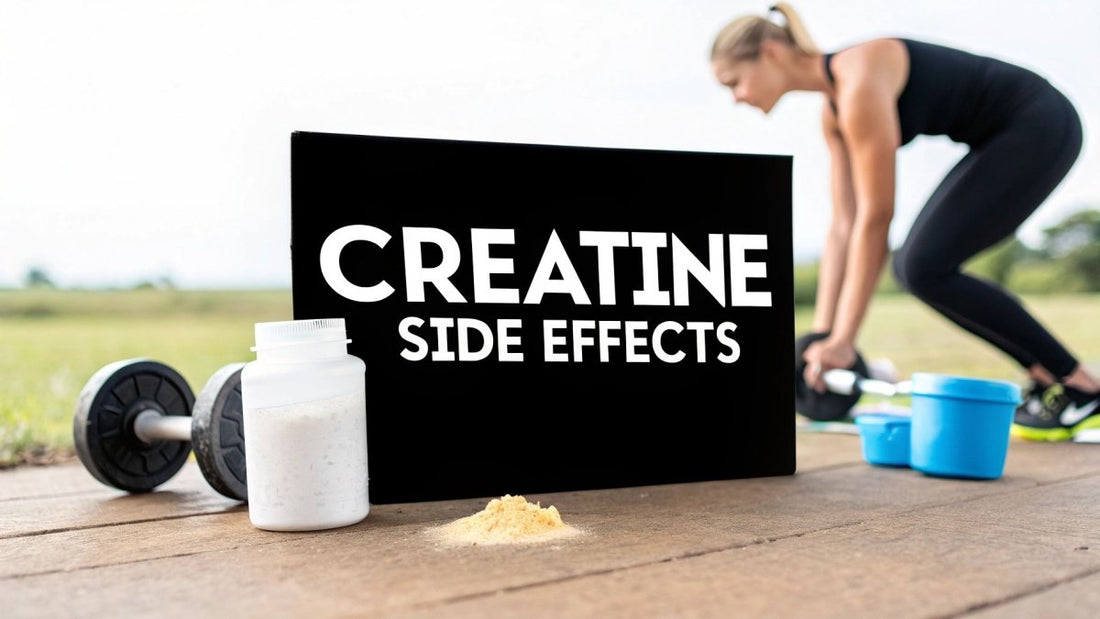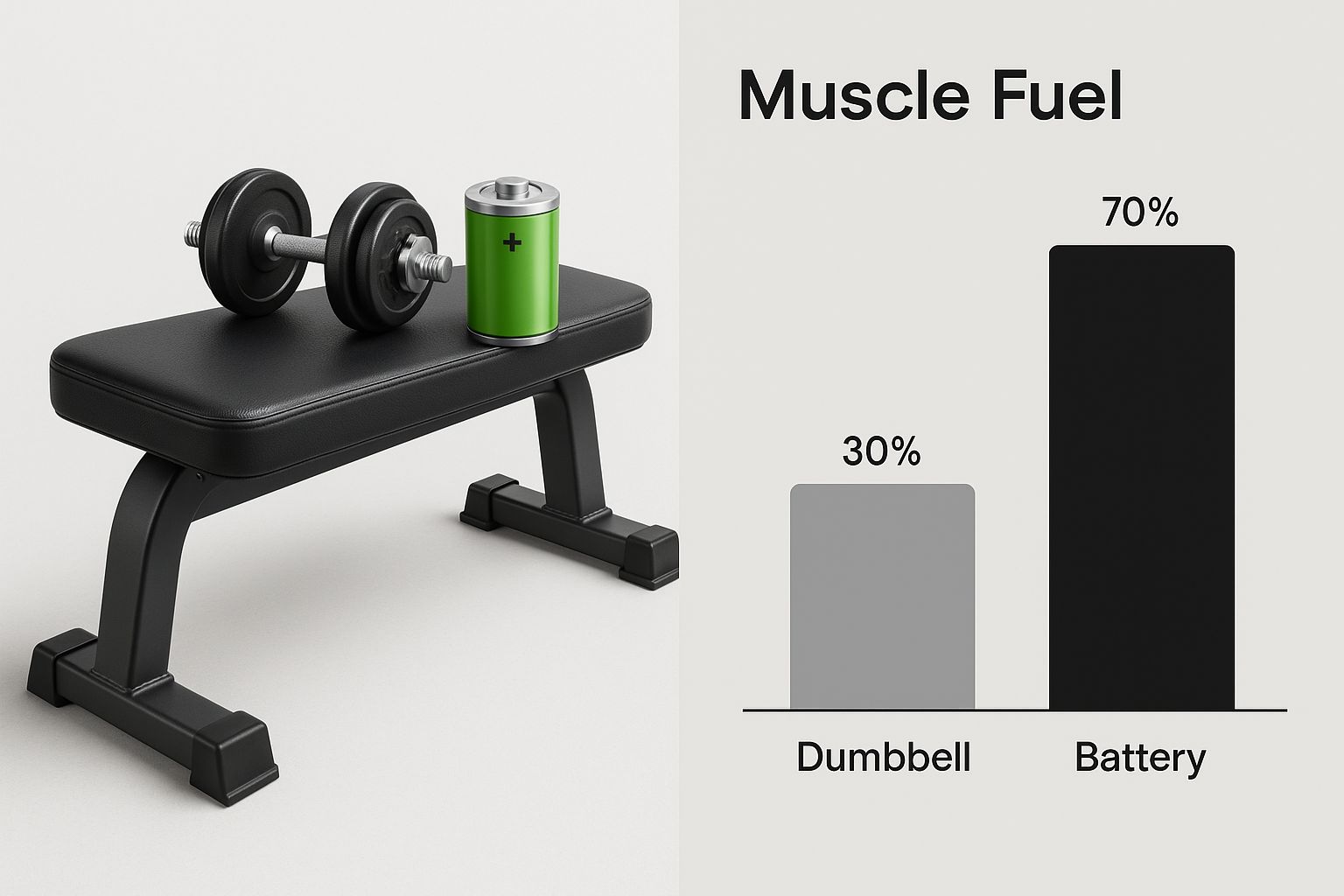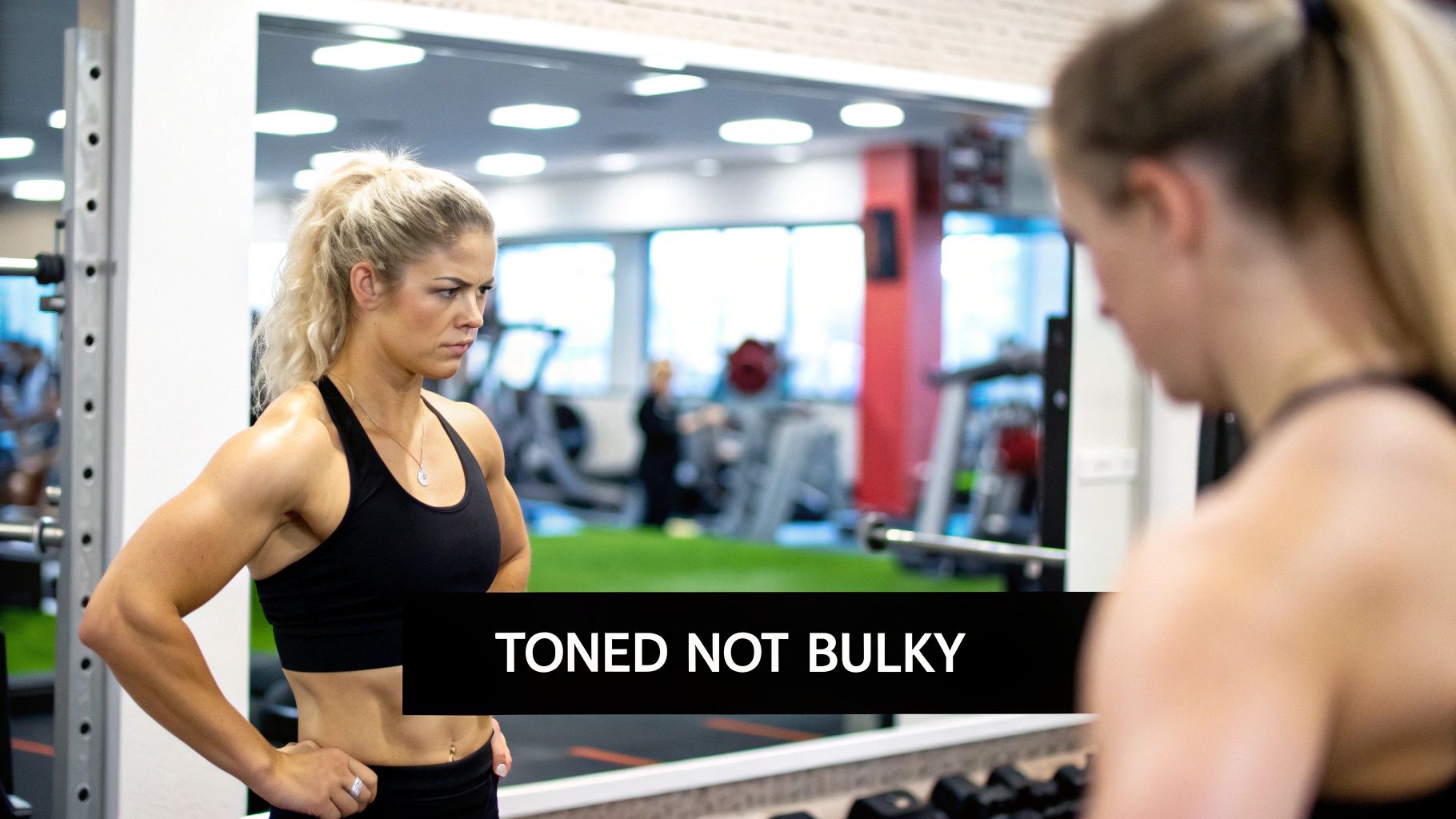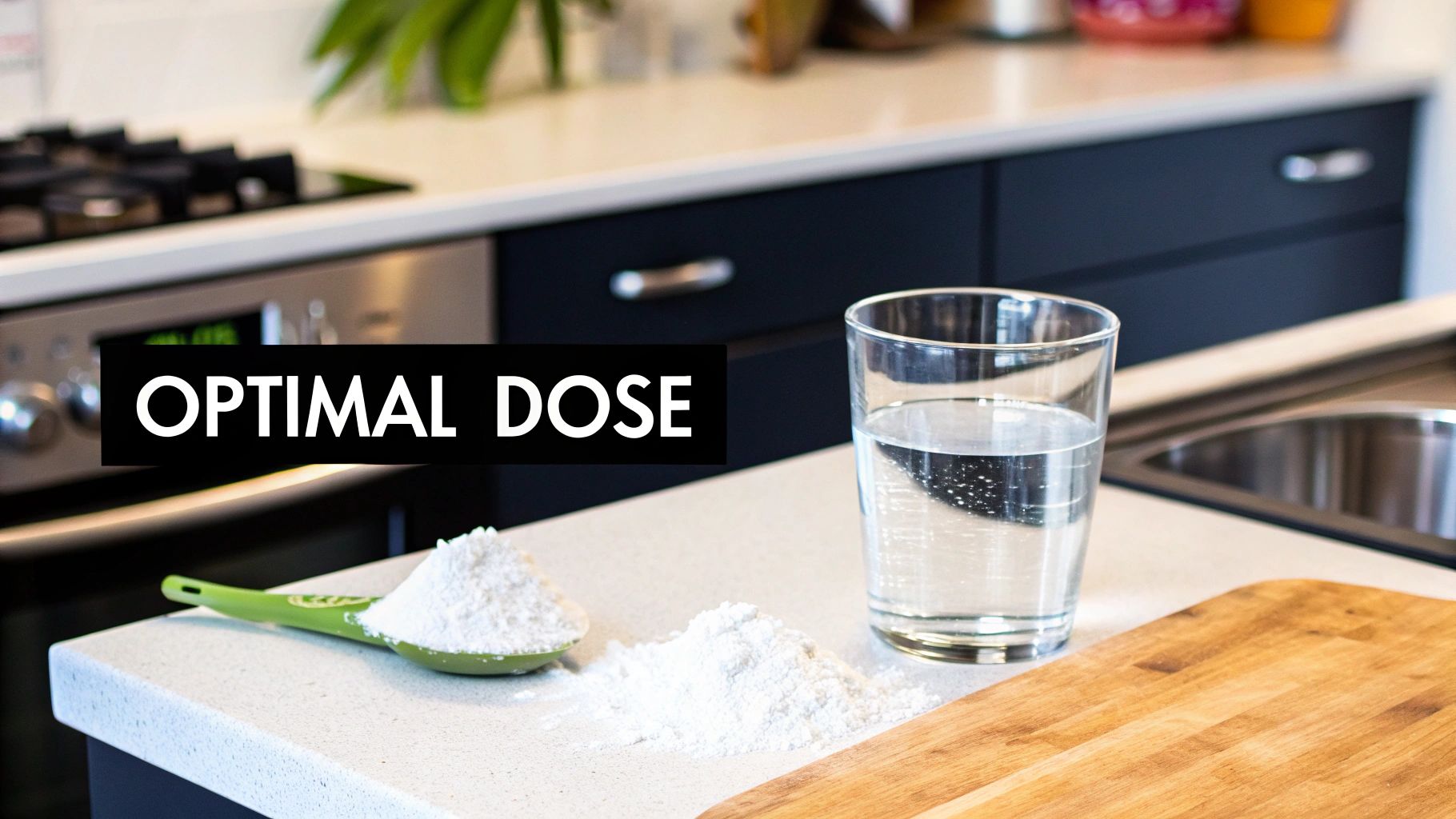
Creatine Side Effects Women: What You Need to Know
Share
When we talk about creatine side effects in women, the good news is that the scientific consensus is overwhelmingly positive. Most women handle creatine just fine, with minimal to no adverse effects. The common fears—like major weight gain or hormonal chaos—are pretty much myths that aren't backed up by solid research.
What Really Happens When Women Take Creatine
Before we get into the nitty-gritty of side effects, it's important to understand what creatine actually is. It's not some strange, artificial stimulant. Creatine is a natural compound that your own body produces to help manage energy.
Think of it like a tiny, rechargeable battery pack for each of your muscle cells.
When you do something quick and intense—like lifting a heavy weight, sprinting for the bus, or jumping during a workout—your muscles burn through a high-energy molecule called ATP. The catch is, you only have a few seconds' worth of ATP for that kind of all-out effort. That's where creatine comes in. It swoops in to quickly recharge those batteries, letting you squeeze out that extra rep or two.
This infographic helps visualize how creatine acts as direct fuel for your muscles, much like a battery powers a device.

The image drives home the point that creatine isn't some complex chemical concoction but a fundamental part of your body's energy system. This simple, effective mechanism is why so many women are getting real, tangible results from it.
More Than Just Muscle
While the performance benefits are well-known, the reasons women are using creatine are getting broader. It’s not always about "bulking up." Instead, it's about achieving practical goals that make a difference in their fitness and daily lives. More and more women are turning to it for:
- Improved Strength: The power to lift a little heavier or finish those last few reps, which helps build a more toned and defined physique.
- Enhanced Performance: Finding an extra gear during high-intensity interval training (HIIT), spin classes, or team sports.
- Faster Recovery: Feeling less sore after tough workouts and bouncing back quicker, which means you can train more consistently.
At its heart, creatine is all about energy recycling. It helps your body regenerate its main energy source (ATP) more efficiently. This directly supports your muscular strength and endurance, which is why the effects can be felt so quickly.
Ultimately, creatine just makes your workouts more effective, helping you get to your goals faster. Most of the worries about creatine side effects women might face are rooted in old-school myths, not science. The few reported issues, like a bit of bloating, are usually temporary and easily managed by adjusting your dose and staying hydrated. We'll bust some of those common myths next.
Let's get one thing straight: creatine has a bit of a reputation, and it's not always a fair one, especially when it comes to women. We need to cut through the noise and debunk the most common myths that keep women from using this fantastic supplement.
Most of the fears around creatine—bloating, getting bulky, gaining unwanted weight—are almost always rooted in a misunderstanding of how it actually works in the body. Once you look at the science, the real picture is far less scary and way more encouraging.

If you're worried about side effects, you're not alone. But the data puts things into perspective. A massive analysis found that the difference in reported side effects between people taking creatine and those taking a placebo was practically nothing.
Seriously. The study showed 13.7% of creatine users reported some kind of side effect, while 13.2% of the placebo group did. That tiny difference is clinically insignificant. If you want to dive into the numbers yourself, you can read the full research on creatine side effect prevalence and see just how minor the risk is.
Myth 1: The Dreaded Bloat and Water Weight
This is the big one. The number one concern I hear from women is the fear of gaining "water weight" and feeling puffy. This myth comes from a half-truth. Yes, creatine increases water retention, but the critical detail is where that water goes.
Think of your muscle cells as tiny balloons. When you supplement with creatine, it pulls water directly inside those cells. This is called intracellular hydration, and it's exactly what you want. It "inflates" the muscle cells, making them feel fuller and firmer, contributing to that toned, athletic look you're working so hard for.
This is completely different from the kind of water retention that makes you feel soft or bloated, which is typically stored right under the skin (subcutaneous water). Creatine doesn't do that; it puts the water to work inside the muscle tissue itself.
The "weight" you might gain in the first week is simply your muscles getting super-hydrated and primed for better performance. It’s a sign the creatine is working, not a sign that you’re gaining fat or unwanted puffiness.
Myth 2: Creatine Will Make Me Bulky
This has to be the most persistent and frustrating myth out there. The idea that taking a scoop of creatine will magically turn you into a bodybuilder is just scientifically wrong.
Getting "bulky" requires two things that creatine alone simply cannot provide: a massive surplus of calories and an intense, high-volume training program designed specifically for hypertrophy. For the average woman using creatine to get stronger and improve her workouts, the result is strength and definition, not size.
- Creatine supports strength: It gives you the energy to push out those extra reps or lift a little heavier, which is what builds lean, toned muscle.
- It enhances definition: By hydrating your muscle cells, creatine helps create a firmer, more defined look.
- It does not cause fat gain: Creatine is calorie-free and has no impact on fat storage.
Think of creatine as a tool to make your workouts more effective. It helps you build a stronger, leaner physique—not a bulky one. The creatine side effects women worry about most are often the complete opposite of what actually happens.
Separating Fact from Fiction
Let's break this down even further. It’s easy to get caught up in gym-talk and rumors, so comparing the common worries with the scientific reality can help clear things up once and for all.
Common Creatine Concerns vs Scientific Reality
This table cuts right to the chase, pitting the most prevalent myths against the actual research.
| Common Concern | The Myth | The Scientific Reality |
|---|---|---|
| Weight Gain | "Creatine will make the number on the scale jump up." | You might see a slight increase at first, but it's just water being pulled into your muscles (intracellular water), which helps you look more toned, not fat. |
| Bloating | "I'll feel puffy and bloated all the time." | This is almost always caused by taking too high a dose (like a "loading phase") or not drinking enough water. A standard 3-5 gram daily dose rarely causes this. |
| Looking 'Bulky' | "I'll get big, bulky muscles like a bodybuilder." | Getting bulky requires a very specific, intense training style and a high-calorie diet. Creatine supports strength and tone, not automatic mass gain. |
When you separate the myths from reality, it becomes obvious that the most talked-about creatine side effects for women are either overblown or easily avoided. Used correctly, creatine is one of the safest and most effective tools you can have in your fitness arsenal.
The Truth About Long-Term Creatine Safety
While temporary issues like bloating are pretty easy to manage, the real question on most women's minds is about long-term safety. What happens if you take it for months, or even years?
The good news is that creatine is one of the most heavily researched supplements on the planet. After decades of study, the overwhelming evidence points to an incredibly strong safety profile, especially for women.
Most of the serious concerns you hear about—like kidney damage or hormonal chaos—have been directly investigated time and time again. The results are consistently reassuring: when taken at the right dose, creatine doesn't cause harm in healthy people. This isn't just wishful thinking; it's a conclusion built on hundreds of studies involving thousands of participants.
What the Research Says About Female Safety
Scientists have paid close attention to how creatine affects women in particular. A huge systematic review pulled together data from 29 different studies, which included a total of 951 female participants.
The results were crystal clear: there were zero deaths or serious adverse outcomes reported among the women taking creatine. If you want to dive into the data yourself, you can explore the full review on female creatine supplementation.
Even better, the review found no real difference in the rate of side effects—like stomach upset or weight gain—between the women taking creatine and those taking a placebo. This kind of robust evidence really helps to tear down the old myth that creatine is somehow dangerous for women's health.
The overwhelming scientific consensus is that long-term creatine use is safe for healthy women. The data shows it does not cause the serious health issues that myths often suggest.
Addressing Kidney Health and Hormonal Balance
One of the most stubborn myths out there is that creatine wrecks your kidneys. This idea usually stems from a simple misunderstanding of how your body processes creatine.
When you supplement, your blood levels of creatinine (a waste product from creatine breakdown) might go up a little. This is a completely normal and expected biological response, not a red flag for kidney damage. If you're worried about this, check out our detailed guide on creatine and kidney health.
Similarly, any worries about creatine throwing your hormones out of whack are unfounded. Research has shown it doesn't negatively impact female hormones. In fact, some studies even suggest that keeping your creatine levels topped up might help support reproductive health and mood stability through different stages of life.
When used correctly, the evidence paints a clear picture: creatine is a reliable and safe tool for the long haul. Think of it less as a short-term gamble and more as a well-researched partner for your fitness goals.
How To Use Creatine And Minimize Side Effects

Getting the most out of creatine is surprisingly simple. It isn't about some complex bio-hack; it's about following a straightforward, effective protocol that gives your body what it needs to perform without causing unnecessary stress. When you're smart about your approach, you can sidestep the most common creatine side effects women worry about.
The entire game plan boils down to three fundamentals: picking the right type, nailing your personal dose, and staying on top of your water intake. Get these right, and you're all set for the performance perks with virtually none of the drawbacks. It’s a simple strategy that keeps you in the driver's seat.
Stick With The Gold Standard
Walking down the supplement aisle, the sheer number of creatine options can make your head spin. But honestly, the scientific community has made this an easy choice: creatine monohydrate is the undisputed king. It’s the most studied, most effective, and safest form on the market, period.
Don't let flashy labels for newer, pricier forms of creatine fool you with claims of better absorption or fewer side effects. Decades of solid research have shown time and again that basic micronized creatine monohydrate works perfectly. Stick with what's proven.
Finding Your Perfect Dose
For most women, the sweet spot for a daily creatine dose is between 3–5 grams. This amount is all you need to gradually saturate your muscles over a few weeks, which is how you unlock its performance-enhancing benefits without overloading your system.
You may have heard of a "loading phase," where people take as much as 20 grams a day for about a week. Frankly, it’s unnecessary for most women and is the number one culprit behind bloating and stomach upset. A smaller, consistent daily dose gets you to the exact same place, just without the potential for discomfort.
To help you decide what’s best for your goals, here’s a quick breakdown of the two main strategies.
Table: Dosage Strategies for Women
| Strategy | Daily Dosage | Duration | Best For |
|---|---|---|---|
| Standard Daily Dose | 3-5 grams | Ongoing | Long-term, sustainable results with minimal risk of side effects. Ideal for most women. |
| Loading Phase | 15-20 grams (split) | 5-7 days, then drop to maintenance | Athletes needing rapid muscle saturation before a competition. Higher risk of GI issues. |
Ultimately, a steady, lower dose is the smarter and more comfortable path for the vast majority of women. If you want to dive deeper into tailoring your intake, our complete creatine dosage guide breaks it all down for expert-level results.
Forget the aggressive loading phase. A steady daily intake of 3-5 grams is the most effective and comfortable strategy for women to reap the full benefits of creatine supplementation without any unwanted side effects.
Hydration Is Non-Negotiable
If there's one rule you can't ignore, it's this one. Creatine works its magic by pulling water into your muscle cells. If you're not drinking enough water throughout the day, there might not be enough fluid left for your digestive system, which can lead to cramping or an upset stomach.
The fix is simple: make hydration a top priority. Aim to drink plenty of water all day long, and maybe a little extra on training days. This one simple habit ensures creatine does its job—hydrating your muscles for better performance—while keeping your digestive system running smoothly. Beyond creatine, many people also look for other nutritional aids to support their fitness journey, like effective protein bars for weight loss.
Surprising Benefits of Creatine Beyond the Gym
When most people hear "creatine," they immediately think of muscle growth and gym performance. While it’s certainly a powerhouse in that arena, its benefits reach far beyond the weight rack, especially for women.
Think of creatine as a versatile energy source for your body's most demanding cells. Your muscles are big energy hogs, but your brain is the most power-hungry organ you have. That’s where some of creatine's most impressive benefits really shine.
Just like your muscles, your brain runs on a constant supply of energy called ATP (adenosine triphosphate). Creatine’s job is to help recycle this energy currency incredibly fast, supporting everything from quick thinking to memory. It’s not just about physical power; it's about mental endurance.
Fueling Your Brain and Mood
Emerging science is starting to reveal just how powerful creatine can be for cognitive health. By making sure your brain cells have the fuel they need, creatine can help sharpen your focus, cut down on mental fatigue, and boost overall cognitive performance. This makes it a fantastic ally for getting through a demanding workday or an intense study session.
It doesn’t stop there. Creatine also seems to play a role in regulating mood. Some studies suggest it can help ease symptoms of depression by restoring brain energy metabolism and promoting healthier neurotransmitter function. While it's no substitute for professional medical care, it shows how creatine can be a tool for supporting your overall well-being. Our complete guide to creatine benefits for women dives deeper into this mind-muscle connection.
Creatine acts like a power-up for your brain, helping to replenish the energy required for sharp thinking and stable mood. It supports your mind with the same efficiency it supports your muscles, making it a well-rounded supplement for overall vitality.
Holistic Health Across Life Stages
Researchers are finding that creatine can support women's health through all sorts of life stages. We're seeing more evidence that it may offer benefits during pregnancy and post-menopause, areas where energy and cognitive function are crucial.
One study even found a link between a creatine-rich diet and a lower risk of certain reproductive issues in American women. Learn more about these findings on women's health.
And yes, it can even support body composition goals. If you're curious about how it helps, you can read more about creatine for weight loss. It’s time we see creatine for what it is: a supplement not just for elite athletes, but for any woman looking to boost her energy, focus, and long-term health from the inside out.
Your Questions About Creatine Answered
Even with all the science laid out, it's totally normal to have a few last questions before starting a new supplement. Let's clear up some of the most common concerns women have about creatine. Think of this as the final check-in to make sure you feel 100% confident and ready.
We'll jump right into the big ones, from the persistent myth about "bulkiness" to practical questions about timing and safety. Every answer is based on solid research, helping you cut through the noise and make the best decision for your body and your goals.
Will Creatine Make Me Look Bulky?
This is easily the most common question, and the short answer is a resounding no. The fear of getting bulky is usually rooted in a misunderstanding of what creatine actually does in your muscles.
Creatine helps your muscle cells pull in and hold more water. This process, called cell volumization, gives your muscles a fuller, firmer, and more toned look—not the oversized appearance you might see in professional bodybuilding. Gaining that kind of mass requires a very specific, high-intensity training regimen paired with a massive calorie surplus. For most women, creatine simply helps you build a stronger, leaner physique by powering more effective workouts.
The "weight" from creatine is just water inside your muscle cells. This actually enhances muscle definition, giving you a more sculpted look, not the soft, puffy feeling people often call "bloating."
Do I Need to Cycle On and Off Creatine?
Nope! The idea of "cycling" creatine—taking it for a few weeks and then stopping—is an old-school myth that modern science has debunked. Your body doesn't build up a tolerance to creatine like it does to stimulants like caffeine.
In fact, the opposite is true. The goal is to keep your muscle's creatine stores topped off, and the best way to do that is through consistent, daily use. A simple, steady dose of 3-5 grams each day is the most effective and research-backed method. It keeps things simple and ensures you get the long-term benefits for performance, recovery, and even brain health without any complicated schedules.
What Is the Best Time of Day to Take Creatine?
Honestly, the "perfect" time isn't nearly as important as just taking it every day. While some studies hint at a tiny advantage to taking it post-workout when your muscles are primed for nutrient uptake, the effect is so small it’s not worth stressing over.
The single most important factor is consistency. Pick a time that fits seamlessly into your daily routine so you never forget. Whether it's in your morning coffee, your pre-workout shake, or a glass of water with dinner, the best time to take creatine is whatever time you'll actually stick with.
Can I Take Creatine If I Am Pregnant or Breastfeeding?
This is one area where you absolutely need to err on the side of caution. While creatine is a natural compound, and some preliminary research even suggests potential benefits during pregnancy, there just isn't enough solid, long-term human data to confirm it's safe.
The universal medical advice is to avoid most supplements during pregnancy and breastfeeding unless you get the green light from your doctor. Your health and your baby's health are the top priority. Always consult with your healthcare provider before even considering creatine or any new supplement during this time.
Ready to smash your goals without the chalky mess of powders? Smash.com offers delicious, high-potency creatine gummies that make supplementation easy and enjoyable. Each serving delivers the full 5g of pure creatine monohydrate you need to boost strength, enhance performance, and support recovery. Try our top-rated gummies and experience the difference at https://smash.com.